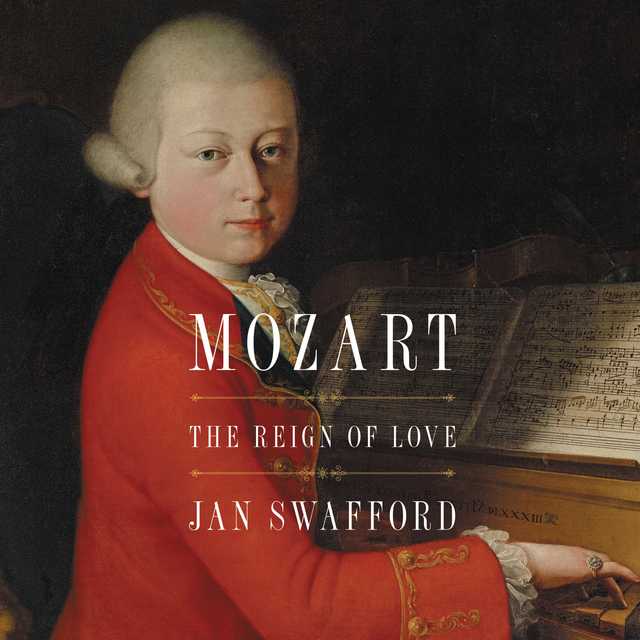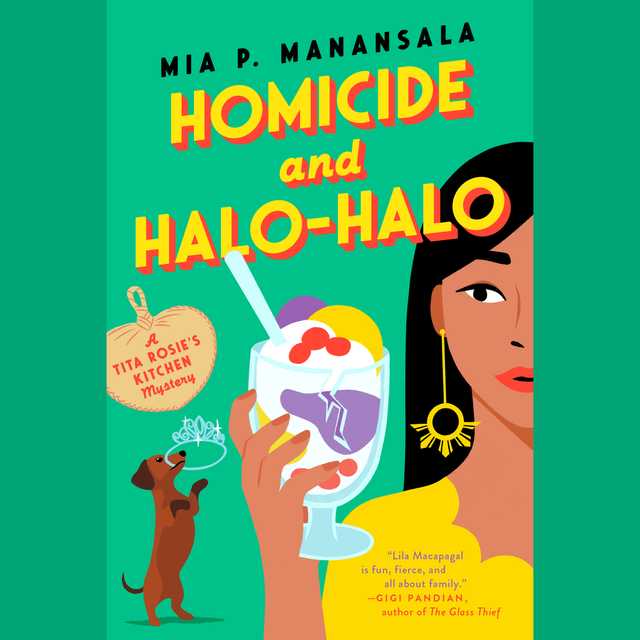Mozart Audiobook Summary
From the acclaimed composer and biographer Jan Swafford comes the definitive biography of one of the most lauded musical geniuses in history, Wolfgang Amadeus Mozart.
At the earliest ages it was apparent that Wolfgang Mozart’s singular imagination was at work in every direction. He hated to be bored and hated to be idle, and through his life he responded to these threats with a repertoire of antidotes mental and physical. Whether in his rabidly obscene mode or not, Mozart was always hilarious. He went at every piece of his life, and perhaps most notably his social life, with tremendous gusto. His circle of friends and patrons was wide, encompassing anyone who appealed to his boundless appetites for music and all things pleasurable and fun.
Mozart was known to be an inexplicable force of nature who could rise from a luminous improvisation at the keyboard to a leap over the furniture. He was forever drumming on things, tapping his feet, jabbering away, but who could grasp your hand and look at you with a profound, searching, and melancholy look in his blue eyes. Even in company there was often an air about Mozart of being not quite there. It was as if he lived onstage and off simultaneously, a character in life’s tragicomedy but also outside of it watching, studying, gathering material for the fabric of his art.
Like Jan Swafford’s biographies Beethoven and Johannes Brahms, Mozart is the complete exhumation of a genius in his life and ours: a man who would enrich the world with his talent for centuries to come and who would immeasurably shape classical music. As Swafford reveals, it’s nearly impossible to understand classical music’s origins and indeed its evolutions, as well as the Baroque period, without studying the man himself.
Supplemental enhancement PDF accompanies the audiobook.
Other Top Audiobooks
Mozart Audiobook Narrator
Tim Campbell is the narrator of Mozart audiobook that was written by Jan Swafford
Jan Swafford is an American composer and author. He earned his bachelor of arts magna cum laude from Harvard College and his DMA in composition from the Yale School of Music. His music has been widely played by ensembles, including the symphonies of St. Louis, Indianapolis, and the Dutch Radio. He is the author of biographies of Ives, Brahms, and Beethoven. His many honors include an NEA Composer Grant and the Deems Taylor Award for online writing on music, which he won for his essays in Slate. He is a longtime program writer and preconcert lecturer for the Boston Symphony Orchestra, and has written notes and essays for the orchestras of Cleveland, Chicago, San Francisco, Detroit, and Toronto. Among his liner notes for recordings are those for DGG’s anniversary release of Beethoven’s nine symphonies by the Vienna Philharmonic.
About the Author(s) of Mozart
Jan Swafford is the author of Mozart
More From the Same
- Author : Jan Swafford
- Language of the Spirit
- Beethoven
- Publisher : HarperAudio
- Abraham
- American Gods [TV Tie-In]
- Dead Ringer
- House of Sand and Fog
- Prey
Mozart Full Details
| Narrator | Tim Campbell |
| Length | 30 hours 22 minutes |
| Author | Jan Swafford |
| Category | |
| Publisher | HarperAudio |
| Release date | December 08, 2020 |
| ISBN | 9780063033986 |
Subjects
The publisher of the Mozart is HarperAudio. includes the following subjects: The BISAC Subject Code is Classical, Genres & Styles, Music
Additional info
The publisher of the Mozart is HarperAudio. The imprint is HarperAudio. It is supplied by HarperAudio. The ISBN-13 is 9780063033986.
Global Availability
This book is only available in the United States.
Goodreads Reviews
Phillip
September 20, 2020
This is an exhaustive biography of Mozart (832 pages) that covers his life in intricate detail and examines the brilliance of his music as well as the complexities of his character and family life. The book also dispels the many historical inaccuries and myths that been ingrained into the public consciousness over the years through liberties taken in film and theatrical depictions as well as gossip. Fortunately for biographers, Mozart's life was well-documented through letters. Indeed, his father, realizing his son's talents and the importance of his legacy, made a concerted effort to record the minute details of their travels, performances and the public's reaction to them. The author does a remarkable job at describing life during this time. The first half of the book, which details the many “concert tours” that Mozart and his sister Nannerl made beginning when Mozart was only five years old, is particularly vivid. The book is as much a biography of Mozart's father (Leopold) as it is him, detailing his drives and desires to immortalize his son. Mozart's relationships with his sister, mother and wife are also closely examined. The descriptions of life during the time is also quite fascinating. The only part of the book I didn't enjoy were the lengthy and technical descriptions of Mozart's work. Readers who have a knowledge of music will no doubt find these analyses worthwhile (the author is a musician himself) but non-musicians like myself, will probably begin skimming. An appendix of musical forms in Mozart's time, bibliography, works cited and an index of musical compositions is included.
Robert
February 19, 2021
There's only ever been one criticism of Mozart's music (and it's wrong, of course): "too many notes."That's actually the criticism I have of Swafford's biography. At 740 densely-packed pages, it's at least 250 pages too long because Swafford is really doing two things here where only one was necessary. The first is the actual biography of Mozart's all-too-brief life and miraculous career, starting when he was five years old and a prodigy through to his death at age 35, while racing to finish his greatest sacred work, his Requiem. But within each chapter, many of which are devoted to the periods of individual tours of Europe or devoted to the periods surrounding the composition of major works, Swafford includes detailed, complicated, and frankly tedious analyses of the musical forms, keys, and the development of individual works, even to the level of individual phrases. It's just "too many notes." A lay reader without an extensive musical theory background is going to get little out of those sections and they completely distract from the wonderful biographical flow of Mozart's life and career. Had he left those sections at a bare minimum, I'd be praising this book much more highly. A real joy to come from reading this biography, however, was the excuse to re-explore much of Mozart's body of work. Just imagine if he had lived another five decades, as his wife did.
Kristianne
July 08, 2022
Whew, I finally made it through this 800-page book! I feel like I could be an expert on Mozart now! XD Really though, this was a fascinating read and I learned so much not only about Mozart and his process, but also about musical forms of that time. The author does include extensive analysis on most of Mozart's major works, so if you're looking for just a straightforward biography, this might not be the book for you, especially if you're not a huge classical music person. ;)Content: (view spoiler)[The author does reference many of Mozart's letters that include his crude jokes and humor. Also, he is rather candid at times about the portrayal of sexual themes in Mozart's operas. It's not explicit, but just wanted to mention that. (hide spoiler)]Overall, this was a fairly easy to read biography and I enjoyed that the author included his own commentary and thoughts to the book, giving it more depth!
Will
February 16, 2022
This is now the third of Jan Swafford's composer biographies that I have read, and I have loved every one of them. Brahms, Beethoven, and now Mozart. (I don't care one whit about Ives, but I have every confidence that Swafford would gave him a superb treatment as well.)Anyway, the Mozart biography was fantastic. Swafford admits up front that Mozart is not going to follow our pre-ordained romanticized vision of what a composer is supposed to be. He was a child prodigy who was happy to live within the confines of a society dominated by aristocrats and the Catholic church. As an adult, after a somewhat difficult break with his father, he mainly wrote what he wanted and lived in domestic bliss with his wife whom he adored.But of course, it's not as simple as that, and Swafford is great at teasing out the fascinating details of Mozart's life and context. Not only that, he proves once and for all that when Mozart died, he was on the cusp of a whole new level of productivity and depth in his compositions, and professional success in his life.Above all, what makes Swafford such a great writer about musicians is that he is a composer himself. He writes about music in a way that makes it come alive and makes the reader rush to their sound system to listen — even to pieces that one has known one's whole life.I hope that Swafford will continue going backwards through music history and give us biographies of Haydn, the Bach sons, JS himself, Handel and even Purcell.
David
April 22, 2021
Five stars because I cannot think of a single thing I would change about it. Well maybe one thing.This book has the annoying characteristic of being so good that the audio version alone won't suffice, you need the hardcopy to refer back to, to check the assertions about how ethereal and moving a particular passage might be, and to occupy a place of honor on a real, not virtual, bookshelf. (This is not the one thing I would change.)I learned a lot reading this book, things you could argue I should have known, about matters like sonata form and where Mozart sits in relation to peers. I marvel at the freshness that a biography here 250ish years later. Swafford appears to bring unbiased eyes to the record. Also, I do not see any sign of a collaborating translator, so the rendering in English of rhyming tomfoolery, which Mozart wrote a lot of, I guess is some handy wordsmithing by the author, because the source material was not English.The one thing I would change is NOT the blow by blow (by blow) account Die Zauberflote, although I am sorely tempted. It takes about as much time to read it as it takes to watch the opera.The one thing I would change is the title, and the closing tie-up-with-a-bow-relating-to-the-title. I think it refers to facts not in evidence. I think the genius just wanted to ply his craft; I think the Greater Motivating Principle is just an imagined reverse construction.
Andrew
February 06, 2021
Such a good book!There is no argument that Jan Swafford is an extremely talented writer and knows his musicology. I have yet to read his other two books on Brahms and Beethoven, but having just finished Mozart I cannot wait. This book is so in depth taking us from Wolfgang's birth all the way to his death and the journey was like drinking a glass of wine - or whatever your favorite beverage might be. The only parts of the book that I had to slog through a little bit is when he breaks down the meter on which Mozart wrote his operas and piano concherto's in, this was largely meant for those who are well versed in music notation and bars. I found myself after the first few instances of Swafford explaining it, simply skimming it. But this is no fault of Swafford's of course, what else does someone expect when reading about a musical prodigy. Another thing that was quite nice was that Swafford takes a very nuanced debunking approach to Mozart in that he tries to dispel some of the myths that have come to be attached to his legend since his death. He really makes you stop and think just how unstable trying to make a career for yourself as a musician was in the 18th century. There were no record labels and you had to depend on the relationships you built within the court and hope that you exhibited enough flair when you played that someone might wish to become your patron. But even having found a patron was not necessarily enough as there were many talented musicians within a given city who quite often had their knives out and would be only to eager to sabotage your career. Mozart was certainly a force of nature and really gave me a new respect for his ability and all he had to overcome, and some of the child prodigies of our lifetime - arguably an Elton John for example.All in all I would recommend this book to anyone interested in Mozart even if you don't possess a strong understanding of musical structure, it doesn't take away from the experience at all, but the rest of the story is very rewarding and Swafford really succeeds in bringing Wolfgang to life. I cannot wait to dive into more of Swafford's work as he has gained himself a new loyal reader.
Thomas
April 13, 2022
By far the finest Mozart biography out there. Erudite masterpiece which provides social, political, psychological, and cultural context in great detail to set critical tone and motive for Mozart's professional and personal life. Nearly all of the traditional folklore regarding a mythic suffering persecuted-genius defining Mozart's life is debunked when facts are cogently laid bare herein. Mozart made a ton of money over his lifetime and was never poor. He expended more then he made by spending almost compulsively on elaborate wardrobes, likely gambling on billiards and cards, and many other frivolities & luxuries. He lived like a prince in the lap of luxury with near universal adulation. His father was an unforgiving controlling taskmaster who hid his true financial worth from his family and scornfully disinherited Mozart, even though almost all his money was made off his children's performances. He never recovered from being left behind by his son's adult success--where to his chagrin he had a naturally diminishing role compared to early years spent guiding an arrestingly talented pair of children. If hand and face washing with soap had been the norm, Mozart could have lived another decade or two--creeping bacterial infections seem to have finished him off.
Philip
February 14, 2021
First, let's get the biographical information corrected....Many years ago on the planet Krypton, Jorel and Lara placed their infant son on a spacecraft enabling it to escape the catastrophe about to consume their planet. Launching it into space without a GPS, it eventually landed in the small yet picture post card alpine village on Earth called Salzburg. Adopted by unsuspecting parents to be the child named Wolfgang at age 5 seemingly, without any musical training, jumped up on a piano bench and played yet unknown tunes which caused his father to exclaim..."He is a miracle." For the next 35 years and 11 months the lad continued to leap tall buildings at a single bound and enjoyed life like a speeding bullet. Really, could this all be true? Jan Swafford presents us with a different story however in 740 pages of action packed string quartets, operas, symphonies, piano concertos and other assorted musical bon bons all to prove a point that all of this has something to do with "Love." And he does so, convincingly. Building his story on the shoulders of such imminent music thinkers as Maynard Solomon, Alfred Einstein, Volkmar Braunbehrens, Edward Dent, H.C. Robbins Landon and a few others, much of the mythical anecdotes are dispelled. Yes, we know who commissioned the Requiem Mass as Mozart neared death (one Herr Franz von Walsegg), and that Mozart was not poisoned by Salieri and that Mozart's marriage to Constanze was truly a loving relationship. Copious end notes and resource reading citations back up Mr. Swafford's presentation and this tome will likely be the "go to" place when looking for details about Mozart and Da Ponte, Mozart and Schikaneder, Mozart and Opera, Mozart and letters to his father (Leopold) and his sister (Nannerl). And did I mention the piano concerti, wind music and string chamber music. All there and ably noted. A few quotes that may encourage you to explore this wonderful read....Mr Swafford opines on page 469..."To make a broad generalization: music needs both simplicity, for coherence and expression, and complexity, for depth and durability."...."Mozart's surface is often deceptively simple and direct. But often in his finest work...the material is richly varied in shape and rhythm and expression....managed by subtle and complex form." Wise words indeed. Or page 471...."No artist made more of pleasure-made it deeper, more liberated, more sensual-than Mozart." I agree. And in a conclusion on page 733...."From childhood, music was his (Mozart's) native language and his mode of living. He thought deeply but in tones, felt mainly in tones, loved in tones, and steeped himself in the world he was creating with tones. From a life made of music he wove his music into the fabric of our times. More and more toward the end, as he reached toward new territories, his art found a consecrated beauty that rose from love: love of music, love of his wife, love of humanity in all its gnarled splendor, love of the eternal yearning for God in the human heart. His work served all that. Whatever his image of God by the time he reached the Requiem, it was taken up in his humanity, and his humanity was for all time, and it was exalted in his art." Moving sentiments indeed. Thus the streaking comet that blazed the sky on January 27, 1756 and expired in December 1791 left us with the profound image of mankind as a better angel. BTW-the author does not explain the letter "K" appended to each of Mozart's cited compositions. In case you find yourself under assault at your Friday evening cocktail reception and this issue arrises: Just remind all those within earshot that Ludwig von Kochel attempted to organize Mozart's output chronologically in the late 19th century with some success. Since then the list has been revised twice and in its 6th edition. The "K" represents Herr Kochel's initial of his last name. With that one reservation this book is highly recommended.
William
August 18, 2021
Wolfgang Amadeus Mozart was an unprecedented prodigy, and his father knew it. "Mozart: The Reign of Love" discusses Mozart's life and work. Author Jan Swafford uses old correspondence and various other sources to piece together Mozart's life.I first got into Classical Music at the age of 12. At this age, Mozart was already composing music. While Mozart did have the prodding of his father, Leopold, it does make me feel inadequate.The book discusses Mozart's behaviors and attitudes. It takes into account his personality and ideas. Furthermore, the book describes Mozart as a tireless artist, a creative force of nature, unbound by the strict cultural mores surrounding him.
Paul
October 19, 2022
This was the most well-written narrative biography of a composer I have ever read. Swafford’s writing style is captivating and engaging. The book is sprawling in length, but it manages to maintain the momentum exemplified in Mozart’s short/prolific life. Effectively dispelling myths propagated by 19th/20th century historians and in pop culture (such as “Amadeus” 1984,) Swafford’s work underscores Mozart’s lesser-known compositions. Using these works as foundational and instructional, Swafford reveals a more compelling and accurate depiction of Mozart’s life.
Jason
June 02, 2022
Fascinating. Well written. There is a lot of musical information which borders on esoteric. It made me wish I knew a lot more about classical music.
Michael
April 21, 2022
I've read many bios of Mozart and other composers. Swafford's are the best! Great biographies to be sure but doesn't skimp on actual musicology and discussion of composition in detail!
Graham
October 17, 2021
This is a great book and I have learned so much from it, albeit I do not have a great knowledge of classical music I found it a brilliant read and I have a tremendous empathy for the life that Mozart lead.
Heather
February 19, 2021
Fantastic! I heard of this when Tyler Cowen recommended it as one of the top books of the year. I trust Tyler's lists, however I thought this one looked intimidating due to the length/cover/general vibe of the book. Instead of buying it for myself I bought it for Christmas for my Mom, a former music teacher. Anyway, I posted the link to Tyler's list on my twitter, my Dad saw it, and he coincidentally also decided to buy my Mom a copy for Christmas. So she had two copies on Christmas Day. I took mine back. At that point, I was like, I might as well read it. I was pleasantly surprised how readable and interesting it was! I took it slow and looked up and lost of the musical works mentioned as I went along, and then made a playlist in chronological order. It has definitely helped me get to know and understand Mozart better. I enjoy when the author gives his explanations of what type of feeling a piece evokes (a couple sipping wine on a spring day, etc.) I was interested the whole time. I am also now wanting to read the author's other books on Brahms and Beethoven. And I am still enjoying my playlist!
Joseph
May 27, 2021
First of all, I have to admit that Mozart was my favorite composer when I was younger and remains one of my favorite ones today, so a new major biography of Mozart is not something I would miss out on. A while ago, I made it a project to read all of Jan Swafford’s biographies, so I was doubly excited when the impending publication of Mozart: The Reign of Love was announced.Since Mozart is one of my favorite composers, I decided to take a leisurely pace through this biography, seeking out additional information on places and historical figures and listening to unfamiliar compositions as I went. Nowadays, the information superhighway provides access to a wealth of online material on figures like Elector Maximilian Theodor of Mannheim and Munich and Elector Maximilian Franz of Bonn, and on the cities of Munich and Bonn themselves. This helps the reader form a clearer picture of Mozart, of the later 18th century, and of the network of familial and professional relationships that connected Mozart and Beethoven, Maximilian Franz and Marie Antoinette. In addition, since youtube.com now has full-length performances of all of Mozart’s operas that I searched for and since the Salzburg Mozarteum has made the New Complete Edition (NMA) of his works available for free online perusal, I was likewise able to develop much clearer sense for the scope of the young Mozart’s achievement in writing eight operas between the ages of 12 and 19. All but the first of these are full-length two and three hour shows, with overture, recitatives, arias, and the rest composed and first conducted by the teenage genius, all in a style that is quite indistinguishable from that of any of the older and more experienced composers of the day. Add to it the rest of the young Mozart’s output of music for the Mass, symphonies, chamber music, and so on, as well as his burgeoning career as a performer on string and keyboard instruments, and the meaning of the words of praise that contemporaries of Mozart as well as his biographers lavish on him becomes much clearer.This added considerable enrichment to my reading, even if Swafford, as in earlier biographies, already devotes considerable effort to bringing the times of the composer to life for the reader. He organizes available data into a readily internalizable form and clarifies and provides detail on a wide variety of the relationships in Mozart’s rich professional life. Of primary importance among these would be that between Mozart and the gifted and theatrically connected Weber family, from their first meeting in Mannheim to the composer’s marriage to Constanze in Vienna some years later. It is likewise refreshing to read a biography that devotes sufficient attention to the relationship between Mozart and Josepha Duschek, the muse that inspired some of the composer’s notable concert arias, including the early and delicious “Ah, lo previdi” (a discovery for me) and “Bella mia fiamma,” and whose Prague villa provided the composer with a home away from home when traveling in that city. Swafford also draws attention to the relationship between Mozart, Lorenzo da Ponte, and noted libertine Girolamo Casanova and with the involvement of the latter in the original production of Don Giovanni; Casanova was evidently dissatisfied with some of the libretto and, for himself at least, rewrote parts of it. For once in a Swafford biography, I found that the biographer does not present the composer’s father as a figure for veneration. Instead, what the reader gets is a much more thorough picture of the master musician that Leopold Mozart himself undoubtedly was, lucid, gifted, an authoritative writer on the violin and on music in general, and an unsurpassable resonator for his young son’s musical intuitions. Swafford pays considerable attention to Leopold Mozart’s attempts to keep his son on track to Paris and away from Aloysia Weber in 1778 as well as, later on, to keep him homing to Salzburg and Archbishop Colloredo and away from Constanze and Vienna in 1781. Ultimately, it is for the individual reader to judge whether the older Mozart was right or wrong to say what he said, or to what degree he was right or wrong. From my own experience, the nexus of love and career is a delicate one. Even if Mozart might well have, for his own sake, chosen a safer path, “people propose, God disposes.” Keeping an ardent young lover away from the beloved can be like depriving a lioness or a she-bear of her cubs, so that the futility of the attempt becomes evident, destiny takes its course, and the world is enriched by Mozart’s making his way in the capital city of Vienna at a turning point for European (and world) history instead of by his taking up the way of the humble church musician in a provincial if affluent setting, a worthy successor to Johann Sebastian Bach. In my opinion, Swafford goes a long way toward presenting the figure of Archbishop Colloredo more fairly than has heretofore been done. The Archbishop, after all, was someone with considerable education and ideological open-mindedness; he also had a job to do and he needed a staff that he could rely on. The misfortune of the time was that people employed to such a person could not just simply quit their job, as Mozart had to apply considerable exertion to do. Here, the name of J. S. Bach again comes to mind, for the earlier composer faced a similar issue with Duke Ernst of Weimar and was obliged to spend a month in prison until he could secure a release from his contract. It is a telling detail that when Mozart died his tragic and untimely death, condolences poured in from all over Europe and not from Salzburg. As with previous biographies by Swafford, this one can be error-prone, a characteristic it shares with the Encyclopedia Britannica and Grove’s. When reading, I at first allowed the occasional glitch to pass as a momentary matter or typographical error, and yet after a while I found the number of blips somewhat alarming, so I began to keep track of them. This began on p. 473 of my Kindle edition, where the “Masonic Funeral Music,” K. 477, is referred to as K. 447, a Köchel number belonging to one of the horn concertos. Earlier, on p. 181, Swafford refers to the “exquisite wind fluting” in the aria “Noi donne poverine” in “La finta giardiniera”; this is untenable, as neither the new nor the old complete editions show the participation of wind instruments at this point in that opera; it is possible that Swafford actually refers to the previous aria, “Dentro il mio petto.” I will not take the time or space to proffer the various lapses I happened to stumble upon in the text. If anyone is interested in knowing them, I will gladly share them with them. A more serious question of error-proneness arises when one assesses the reputability of the secondary sources that Swafford takes into consideration. Is the biographer, in his zeal to present a lifelike picture of the times, coming to false conclusions in some respects? I, for one, am not in a position to judge, and the truth about certain matters we may never know. I feel much more on solid ground without losing any fascination for the material when Swafford foregrounds documentary evidence that other biographers do not emphasize, such as certain passages from Mozart’s correspondence, or else draws attention to newly-discovered or little-known data, such as the extant correspondence between Leopold Mozart and Countess Waldstätten. Therefore, I find before me a compelling, engagingly-written biography of a master composer who is frequently misunderstood if often touted. As a way of fleshing out the life and times of the later 18th century, as a summary of recent research on Mozart, as a fresh viewpoint on the composer’s work, I find this biography invaluable. As a first Mozart biography for any reader, it will do finely; however, for that purpose some may prefer Stanley Sadie’s “Mozart: The Early Years” or the works of Robbins-Landon, if only for their relative objectivity of tone, even if additional data concerning the life of Mozart may have surfaced since those other works were written.
Bookreporter.com
January 31, 2021
As I closed the back cover of MOZART: THE REIGN OF LOVE, wishing incredibly that it might go on just a little longer than its 800-and-some pages, I suddenly realized that the hero of Jan Swafford’s amazing biography was just half my age when he died on December 5, 1791.Had Wolfgang Amadeus Mozart lived beyond 35, a point at which the world already recognized him to have “arrived” as a consummate composing and performing artist, what further marvels might he have accomplished? Anyone who has written about this 18th-century child prodigy-turned-musical superhero has asked the same question in various forms, usually accompanied by far too much lament and baseless speculation.Like his precursors from the early 19th century to the past decade, Swafford also could have milked the hypothetical “future Mozart” idea, but gives it an elegant pass every time it comes up. And thank goodness for that. There was simply so much packed into the short life Mozart actually led --- easily the equivalent of half-a-dozen hard-working musicians from any era.Instead of hypothesizing, or further mythologizing a life whose true facts are far more interesting than popular fiction, Swafford dug deep into every conceivable fragment and tidbit of the Mozart family’s life and times, along with those of their friends, relatives, employers, rulers and influencers.But what makes MOZART: THE REIGN OF LOVE yet another milestone in Swafford's series of substantial composer biographies (Charles Ives, 1996; Johannes Brahms, 1997; Ludwig van Beethoven, 2014), of which the shortest exceeds 500 pages, is his unique fusion of raw data with truthful storytelling and thoughtful extrapolation. Orchestrating words and themes as deftly as any of the composers he so vividly has revealed to date (who will be next, we wonder?), Swafford transforms a deluge of available information into imaginative yet fact-based contexts that reveal Mozart’s talent in a down-to-earth and memorably human way.While keeping to a broad chronological structure, Swafford creates a very real-time environment in which multiple events --- domestic, personal, artistic, political, historical --- continually collide and interweave. That's life happening. Mozart was no solitary genius, in fact quite the opposite. His life was simultaneously lived in the moment and at great depth. The book’s many detours into the affairs of his bossy father Leopold, submissive but practical mother Maria Anna, and talented but suppressed older sister Nannerl, as well as the comings and goings of numerous friends, colleagues, rivals and aristocratic employers, all reflect many facets of themselves and the prodigious talent at the center of this musical vortex.Interspersed among segments of the composer’s life, MOZART: THE REIGN OF LOVE includes numerous portrayals of individual works. To keep his biography less technical but still substantial enough to reach every level of music lover, Swafford completely dispensed with illustrative score fragments and chose the higher, far more difficult road (for the writer, not the reader) of intimately describing the mood, tonal color and structure of many celebrated pieces.In deft, empathic and knowledgeable prose, he treats a piano concerto here, an aria there, a string quartet or opera scene somewhere else, as lovingly as one might describe a dear friend: all as unique “personalities,” entirely formed within the reader’s receptive imagination. This is the great paradox of writing about music, which truly lives when being played and heard, yet whose individual notes last only as long as the vibrations of air will allow. Even Mozart’s voluminous scores were silent road maps, revealing his art only to those able to decipher and animate their particular language.One of the biggest surprises to 21st-century readers with a reverence for history and its artifacts is just how ephemeral music could be in Mozart’s day, when score-copying was done entirely by hand and print publication was often too costly to invest in. Original manuscripts circulated among friends and working colleagues; some were cared for and returned to their creators, others pirated and appropriated under false names, still others lost or discarded.Mozart wasn’t the only late-18th-century composer accustomed to dashing off chamber music, symphonies, cantatas and the like for single-use occasions, or at the most for a brief series of performances. At the time, last week’s scores were usually ignored like last week’s news. As Swafford reiterates a number of times, Mozart was always looking ahead to the next commissioned piece and typically had several scores on the go. In the end, although the disease or condition that killed him so young was never firmly established, Swafford sensibly suggests that it was a combination of prolonged overwork and incompetent doctors. Ironically, the next generation of composers and doctors heralded a different society, one in which the training and artifacts of both professions vastly increased in respect and value.While it’s impossible to do justice to the sheer size and skilled density of MOZART: THE REIGN OF LOVE in the space of a single review, one can’t leave out another area in which Swafford excels in the art of reassessing the composer’s remarkable life. That was the women in it.Instead of being ushered into the shadows of history, they are portrayed honestly and generously through their talents, intelligence, bravery, cunning, endurance and character. Whether in Vienna, Salzburg, Prague, Berlin, Paris or any number of European musical centers, it was no easy road for women to survive and excel as independent solo instrumental performers, professional singers, business managers, conductors, patrons, impresarios, musicians’ wives or mothers. Most notably, Swafford fleshes out Mozart’s stoic, opinionated and sensible wife Constanze, who would live well into the 19th century and revive a youthful singing career after her illustrious husband’s death.Many readers will come to MOZART: THE REIGN OF LOVE with an enviable recognition of his many groundbreaking scores by name or catalogue number and perhaps imaginatively hear them while reading. But for the rest of us, who need to run to our recorded libraries after every chapter, the rewards of this unsurpassed Mozart biography will be just as delicious.Reviewed by Pauline Finch
Matt
February 14, 2021
A wonderful biography of Mozart in all of his forms - a world-historic child prodigy, musician, and perhaps the greatest composer of all time (despite dying at 35!). This book offers a real glimpse into how he lived his life. If, like me, your view of Mozart the man was shaped by the movie Amadeus, forget all that and give this book a try.Just two things knocked it down a star for me: there is a LOT of musical analysis here, and I skipped it. It is double diamond, experts only terrain, and I'm barely on the bunny slope of musicology. And in listening to the Audible edition, I wondered yet again why they couldn't do more with the audio book by adding snippets of music. I know that would increase the cost of copyrights, but I would have gladly paid more to be actually able to hear the music rather than just hear about it.Still, this book is very worth your while and will leave you in awe of a genius nearly beyond comprehension.
Most Popular Audiobooks
Frequently asked questions
Listening to audiobooks not only easy, it is also very convenient. You can listen to audiobooks on almost every device. From your laptop to your smart phone or even a smart speaker like Apple HomePod or even Alexa. Here’s how you can get started listening to audiobooks.
- 1. Download your favorite audiobook app such as Speechify.
- 2. Sign up for an account.
- 3. Browse the library for the best audiobooks and select the first one for free
- 4. Download the audiobook file to your device
- 5. Open the Speechify audiobook app and select the audiobook you want to listen to.
- 6. Adjust the playback speed and other settings to your preference.
- 7. Press play and enjoy!
While you can listen to the bestsellers on almost any device, and preferences may vary, generally smart phones are offer the most convenience factor. You could be working out, grocery shopping, or even watching your dog in the dog park on a Saturday morning.
However, most audiobook apps work across multiple devices so you can pick up that riveting new Stephen King book you started at the dog park, back on your laptop when you get back home.
Speechify is one of the best apps for audiobooks. The pricing structure is the most competitive in the market and the app is easy to use. It features the best sellers and award winning authors. Listen to your favorite books or discover new ones and listen to real voice actors read to you. Getting started is easy, the first book is free.
Research showcasing the brain health benefits of reading on a regular basis is wide-ranging and undeniable. However, research comparing the benefits of reading vs listening is much more sparse. According to professor of psychology and author Dr. Kristen Willeumier, though, there is good reason to believe that the reading experience provided by audiobooks offers many of the same brain benefits as reading a physical book.
Audiobooks are recordings of books that are read aloud by a professional voice actor. The recordings are typically available for purchase and download in digital formats such as MP3, WMA, or AAC. They can also be streamed from online services like Speechify, Audible, AppleBooks, or Spotify.
You simply download the app onto your smart phone, create your account, and in Speechify, you can choose your first book, from our vast library of best-sellers and classics, to read for free.
Audiobooks, like real books can add up over time. Here’s where you can listen to audiobooks for free. Speechify let’s you read your first best seller for free. Apart from that, we have a vast selection of free audiobooks that you can enjoy. Get the same rich experience no matter if the book was free or not.
It depends. Yes, there are free audiobooks and paid audiobooks. Speechify offers a blend of both!
It varies. The easiest way depends on a few things. The app and service you use, which device, and platform. Speechify is the easiest way to listen to audiobooks. Downloading the app is quick. It is not a large app and does not eat up space on your iPhone or Android device.
Listening to audiobooks on your smart phone, with Speechify, is the easiest way to listen to audiobooks.






























